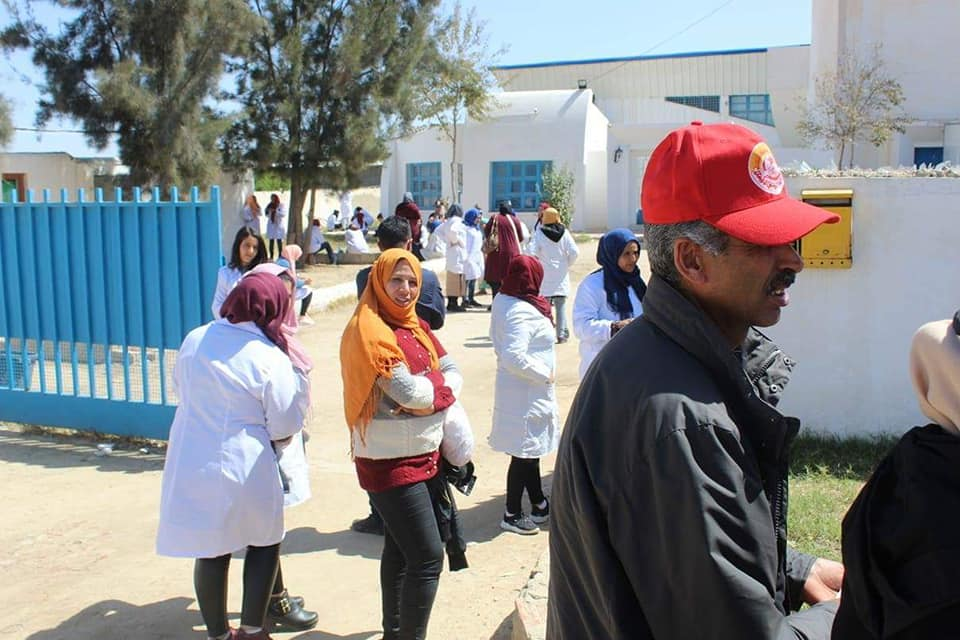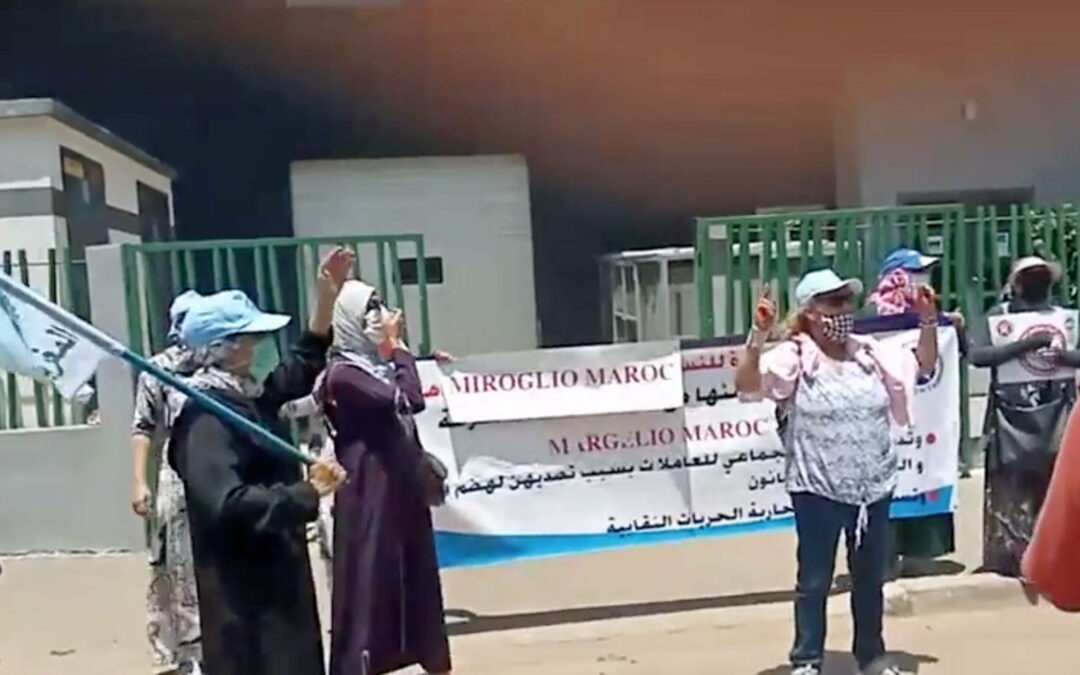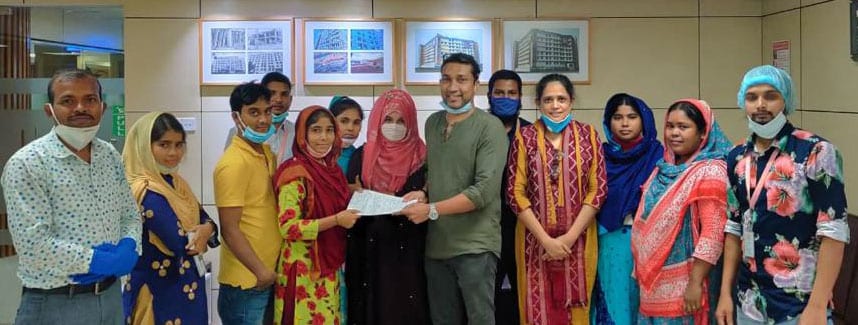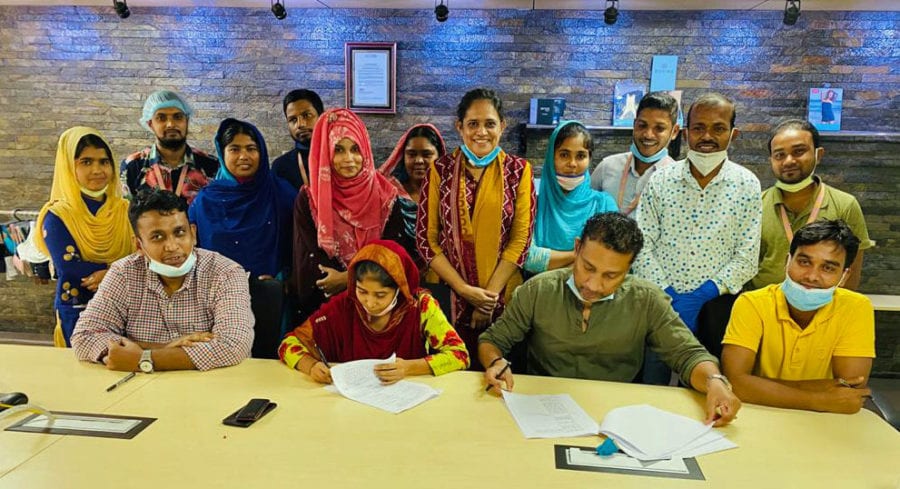
Sep 9, 2020
The Tunisian General Labor Union (UGTT) is calling on employers and the government to join with it in addressing the severe challenges textile workers are facing during the COVID-19 crisis and negotiate an action plan to guide the struggling garment sector.
Some 160,000 workers, the vast majority of whom are women younger than age 35, work in Tunisia’s textile industry, which accounts for 34 percent of the country’s manufacturing sector. Following the country’s coronavirus lockdown, workers lost jobs and pay, in part because the industry experienced a 45.2 percent decline in textile exports in March from the previous year, according to the National Institute of Statistics in Tunisia. Many corporate brands also canceled “mid-season” orders.
But crucially, employers also took advantage of the COVID-19 crisis to cease or suspended paying workers’ social security benefits or family allowances, such as food tickets, under the pretext of force majeure, union leaders say. Employers coerced workers, especially new employees, into signing fixed-term contracts and giving up their status as permanent workers. Workers also say some employers blocked their efforts to form unions to gain fundamental rights on the job, closed union offices—prohibiting workers from meeting in the office even outside working hours—and removed posters and other legally placed union material from worksites.

Habib Al-Hazami. Credit: General Federation of Textile Leather and Footwear
“All trade union activists and the General Federation affirm that the garment and textile sector in Tunisia has been marginalized and is facing a crisis,” says Habib Al-Hazami, general secretary of the General Federation of Textile, Leather, and Footwear.
In April, the Tunisian General Labor Union (UGTT) and the Tunisian Federation for Industry and Trade entered into a landmark agreement on workers’ wages, including textile workers’ wages. The government agreed to contribute $73 per worker, with the remaining salary paid by employer. Employers also agreed to register unregistered workers with the National Social Security Fund within a month after the agreement to ensure they are eligible for social benefits.
Although the lockdown ended June 27 and many factories resumed nearly full production, union leaders say worker rights’ violations persist, with factories not following government regulations to slow the spread of the novel coronavirus.
In calling for discussions with employers and the government, UGTT is seeking to:
- Strengthen job security for garment and textile workers by reducing short-term contracts and increasing formal employment.
- Examine how best to restructure the sector with a focus on ethical market competition so workers do not bear the brunt of corporate brands’ rush for products at the lowest cost.
- Take urgent steps to end gender-based violence and harassment at work and ensure decent working conditions.
- Increase workplace inspections to monitor potential safety and health violations.
- Create space for workers to form and join unions so they have a voice on the job.

Aug 7, 2020
Garment workers at the Miroglio Maroc factory are standing strong with 14 co-workers who they say were fired for speaking out against the lack of sufficient safety gear and other protective measures at the workplace during the novel coronavirus pandemic.
Three workers were recently diagnosed with COVID-19, and the 14 fired workers alerted authorities to the unsafe working conditions at the plant, where up to 250 workers make ready-wear garments. The employer says he fired the workers, eight of whom are union members, for “defamation,” that is, allegedly attacking the reputation of the company.
Yet the Moroccan Labor Union (UMT) says the owner also fired workers who took part in forming the factory union in April. The employer also sought to intimidate the 14 fired workers, all of whom worked at the factory between five and six years, by calling in a judicial commissioner, a move the UMT says violates Morocco’s labor law. Their union, the Union Office of Miroglio Marco, is affiliated to the Federation of Garment, Textile, and Leather Workers/UMT.
Factory union leaders say the employer refuses to pay the fired workers for May and June, and demanded they sign a statement saying they will not strike, a move prohibited by the country’s labor law. Further, union representatives say the general manager has verbally harassed women garment workers who requested safety and health protections.
Workers now are waiting for the results of their COVID tests, which the company was forced to undertake after the workers alerted authorities.
Employers worldwide are penalizing and even firing workers who demand their rights to safety measures to protect against COVID-19, and are using the pandemic to lay off workers, often targeting those seeking to form unions or exercise their rights on the job. But, together with their unions, workers are fighting back.
Clapping as they rallied outside the plant in Casablanca’s Albarnoussi industrial district in recent days, the workers chanted, “We do not want injustice, we do not want to strip women of their rights.”
“Long live the Moroccan labor union.”

Jul 30, 2020
After hundreds of laid-off garment workers took to the streets of Ashulia, Bangladesh, and rallied at the Dhaka Export Processing Zone in recent weeks, factory management and the Bangladesh Export Processing Zones Authority agreed to compensate them with one month’s wages and the annual Eid festival bonus.

Maksuda: “When we united together, management had no choice.” Credit: Shumon Ali
Because all 130 retrenched workers had worked at the factory less than a year, the company was not required by law to provide them with compensation after they were laid off. Yet all the workers received between $150 and $315, a major achievement that Maksuda, one of the factory workers who took part in the action, says resulted from unity and collective action.
“I did not think we would get it, but when we united together management had no other choice. I am quite happy with the money I have received.”
The Talisman Limited factory workers are among tens of thousands of Bangladesh garment workers who have lost their jobs because of declining clothing orders worldwide following outbreak of the COVID-19 pandemic. The government reports that 29,369 garment workers have been laid off, but union leaders say the numbers are much higher.
Garment Workers Stand Together to Win Pay after Country-wide Layoffs
Workers and unions have been taking action at factories around the country in response to layoffs, and in many cases have blocked traffic or halted work to have their demands met. Overall, Bangladesh has lost more than $3.18 billion in orders since April and the start of COVID-19, according to the Bangladesh Garment Manufacturers and Export Association.
Maksuda, like the other retrenched factory workers, received her layoff notice by text message. Desperate to support her family, she joined with Farida, Tania and 11 other laid-off garment workers to contact the Solidarity Center for assistance.
The Solidarity Center legal team advised each worker to seek one month’s basic pay as compensation, along with a festival bonus. The next day, the leaders organized all the retrenched workers and went to the factory, but they found the factory gates locked and no management in sight, so they proceeded to the Dhaka Export Processing Zone to demand payment. In the process, they set an example of the concrete gains collective action can achieve.
Talisman Limited employs some 1,200 workers, at least 70 percent of whom are women.
Jun 24, 2020
The garment industry tends to invest where the rule of law is weakest, where there are sizable degrees of poverty and a degree of impunity, said the Solidarity Center’s David Welsh on the podcast, “On the Level with Jeff Hutton,” With the advent of the pandemic, millions of workers are left without wages and economic and job security–and the blame lies with the brands, he said. (Starts at minute 19:30)

Jun 22, 2020
More than 2,000 garment workers in Bangladesh are celebrating a new collective bargaining agreement that includes a 10 percent pay increase—double the amount required by law—and creation of a committee to prevent violence and harassment on the job. The pact, negotiated by the Hop Lun Apparels Ltd. Sommilito Sramik Union (HLALSSU), is retroactive to January.
The new agreement comes as many garment workers in Bangladesh and around the world are being laid off without pay because major fashion brands are canceling orders due to lack of demand during the novel coronavirus pandemic.

2,000+ Bangladesh garment workers have new contract that includes a 10 percent wage increase and a day care facility for their children. Credit: SGSF
“The guarantee of promotions for women to the higher posts and the establishment of the sexual harassment committee will empower the women and provide safeguards against sexual abuse and harassment in our factory,” says Aklima HLALSSU president.
Under the new contract, Hop Lun will set up a day care facility for workers’ children younger than age six, who will be guaranteed quality care and education. Factory management will provide free ultrasound tests for all pregnant workers, subsided food in the factory canteen, and guarantee a minimum of 20 women workers will be promoted annually.
Under Bangladesh law, women workers are entitled to 16 weeks’ maternity leave, yet employers often do not grant garment workers the required leave. The new contract provides enforcement of the law.
“It is because we have a strong union that we could maintain a good relation with the factory management and sign this collective bargaining agreement,” says Sommilito Garments Sramik Federation (SGSF) General Secretary Nahidul Hasan Nayan. “That is why, during this COVID-19 crisis, Hop Lun factory maintained the highest standard of safety for its workers and has provided each and every employee with proper protective equipment.”
The contract also includes provisions to streamline union representation, with the employer providing space for a union office and automatically deducting union dues. Union leaders will be involved in trainings and workshops and joint meetings with management.







